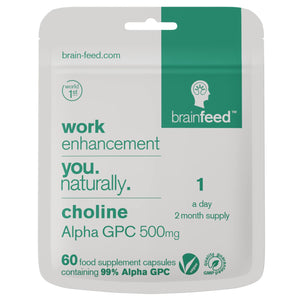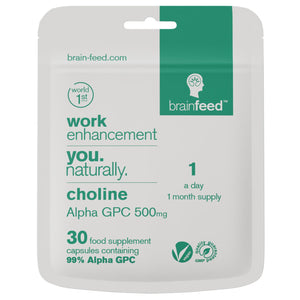Choline deficiency & brain health: Easy steps to stay sharp
filter
The US National Institutes of Health estimates that around 90% of Americans are choline deficient, highlighting a widespread issue that goes beyond specific eating habits[1 Trusted Source 2018 - Nutrition Today Systematic and meta-analysis Choline: The Underconsumed and Underappreciated Essential Nutrient ] . While there’s been particular attention on choline intake in plant-based diets[2 Trusted Source 2019 - British Medical Journal Nutrition, Prevention and Health Research evaluation Could we be overlooking a potential choline crisis in the United Kingdom? ] , everyone, regardless of dietary preference, can benefit from understanding how to meet their choline needs. The good news? With the right foods, it’s entirely possible to meet daily choline requirements, including through plant-based sources. Here's how.
What is choline good for?
Choline plays vital roles in the liver, brain, and body cells from pregnancy and infancy through to old age. What does choline do? It is a precursor to acetylcholine, a brain chemical essential for working memory, attention, and learning[3 Trusted Source 1991 - The Federation for American Societies for Experimental Biology Journal Human study Choline, an essential nutrient for humans ] . What are the symptoms of low choline? Having trouble memorising and recalling what you learned can be a symptom of choline deficiency. On the contrary, a study on mild cognitive impairment found that 71% of 2,044 patients who took a daily choline supplement called Alpha GPC experienced “no cognitive decline” or “forgetfulness”[4 Trusted Source 1994 - Annals of the New York Academy of Sciences Research evaluation α-Glycerophosphocholine in the Mental Recovery of Cerebral Ischemic Attacks ] . Additionally, an animal study indicated that higher acetylcholine levels may enhance performance on tasks requiring sustained attention[5 Trusted Source 2000 - Cognitive Brain Research Animal study Increases in cortical acetylcholine release during sustained attention performance in rats ] .
What are the symptoms of choline deficiency?
Chronic low choline can lead to a variety of symptoms, including fatigue, memory problems and liver issues. In severe cases, choline deficiency symptoms can even affect the nervous system. It happens to people whose meals lack choline-rich foods so it’s important to maintain a diverse diet. Which food is highest in choline? Choline-rich foods are found in animal protein (per 100g) such as beef liver (426mg), fried egg (273mg) and smoked salmon (224mg)[6 Trusted Source 2003 - The Journal of Nutrition Research evaluation Concentrations of Choline-Containing Compounds and Betaine in Common Foods ] .
How do I know if I have choline deficiency?
Traditional test methods to assess choline deficiencies include blood tests and identifying biomarkers in urine samples[7 Trusted Source 2012 - British Journal of Nutrition Human study Choline supplementation and measures of choline and betaine status: a randomised, controlled trial in postmenopausal women ] ,[8 Trusted Source 2015 - The FASEB Journal Human study Variability in Plasma Free Choline and its Relation with Diet and Potential Plasma Biomarkers ] ,[9 Trusted Source 2010 - Journal of Chromatography B Research evaluation Quantification of acetylcholine, choline, betaine, and dimethylglycine in human plasma and urine using stable-isotope dilution ultra performance liquid chromatography–tandem mass spectrometry ] . These are only indicative of a small snapshot in time and provide inadequate insight into brain health. Novel testing techniques are in the pipeline.
Can you take choline every day?
A 180-day study into a potent form of choline, Alpha GPC, actually found that daily continuous supplementation of 1200 mg is without adverse effects. Let’s have a look at how much choline per day is recommended in the EU and US.
|
European Food Safety Authority Dietary Reference Value (DRV) for choline |
|
|
Age |
Mg/day |
|
15+ years |
400 |
|
Pregnant women |
480 |
|
Lactating women |
520 |
|
United States Daily Adequate Intakes (AI) for choline |
||
|
Age |
Male (mg/day) |
Female (mg/day) |
|
14 – 18 years |
550 |
400 |
|
19+ years |
550 |
425 |
|
Pregnancy |
|
450 |
|
Lactation |
|
550 |
Are vegetarians low in choline?
Because choline is found predominantly in animal-derived foods, choline deficiencies in vegans and vegetarians are more frequent[1 Trusted Source 2018 - Nutrition Today Systematic and meta-analysis Choline: The Underconsumed and Underappreciated Essential Nutrient ] . The current absence of clinical and longitudinal study data on vegans represents a challenge. Popular veganism is a relatively new phenomenon and over 60% of all global studies conducted into the impact of a vegan diet have been commissioned in recent years. More studies are needed to check if low choline levels are attributed to vegan brain fog. The body of data is growing, and there will be more evidence in the future.
The best way to avoid deficiency is to ensure adequate intake of choline. The important question to ask is “How can I obtain adequate choline on a vegan diet?"
How do vegans get choline?
The great news is that you can obtain your daily adequate intake (AI) of choline from plant-based sources making sure you get enough of your memory chemical building block even if you follow a vegan diet. You need to be mindful to ensure a variety of choline foods - vegan-friendly and plant-based - are a part of your daily diet.
|
Foods (per 100g) |
Choline per serving (mg)[10 Trusted Source 2019 - Physics Comitte for Responsible Medicine 3rd-party source Clearing Up Choline Confusion ] |
|
Wheat germ, toasted |
182 |
|
Soybeans, roasted |
167 |
|
Mushroom shiitake, cooked |
90 |
|
Brussel sprouts, boiled |
75 |
|
Kidney beans, canned |
69 |
|
Peanuts, dry roasted |
48 |
|
Cauliflower, pieces, boiled |
37.5 |
|
Green peas, boiled |
37.5 |
|
Quinoa, cooked |
33 |
|
Potatoes, red, baked, flesh and skin |
15 |
What is the most effective choline?
Say hello to Alpha GPC, a natural and potent choline form. Food-derived choline and other forms of choline such as choline bitartrate require complex mechanisms of action to enter the brain[11 Trusted Source 2020 - National Institutes of Health 3rd-party source Choline ] . Those with low intake of choline-rich foods can benefit from supplementation. Alpha GPC and citicoline can freely enter the brain and get converted into acetylcholine. Alpha GPC is 40% choline by weight which is over double the amount contained in Citicoline (18.5%). If you're considering a vegan choline supplement brain feed’s 500mg Choline (alpha GPC) supplement is the world’s first 99% 500mg alpha GPC[1 Trusted Source 2018 - Nutrition Today Systematic and meta-analysis Choline: The Underconsumed and Underappreciated Essential Nutrient ] .
Whether you’re practising veganism or sticking to different diets, there’s a chance that you’re low in choline. Make sure your diet is full of choline-rich sources to keep your body and brain balanced.

References
[1] Wallace, T. C., Blusztajn, J. K., Caudill, M. A., Klatt, K. C., Natker, E., Zeisel, S. H., & Zelman, K. M. (2018). Choline: The Underconsumed and Underappreciated Essential Nutrient. Nutrition today, 53(6), 240–253. https://journals.lww.com/nutritiontodayonline/fulltext/2018/11000/choline__the_underconsumed_and_underappreciated.4.aspx
[2] Derbyshire, E. (2019) Could we be overlooking a potential choline crisis in the United Kingdom? British Medical Journal Nutrition, Prevention and Health, 2. https://nutrition.bmj.com/content/2/2/86
[3] Zeisel, S.H., Da Costa, K. A., Franklin, P. D., Alexander, E. A., Lamont, J. T., Sheard, N. F., & Beiser, A. (1991) Choline, an essential nutrient for humans. The Federation for American Societies for Experimental Biology Journal, 5(7), 2093–2098. https://www.sciencedirect.com/science/article/abs/pii/S089990070000349X
[4] Sangiorgi, G. B., Barbagallo, M., Giordano, M., Meli, M., & Panzarasa, R. (1994). α-Glycerophosphocholine in the Mental Recovery of Cerebral Ischemic Attacks. Annals of the New York Academy of Sciences, 717, 253–269. https://nyaspubs.onlinelibrary.wiley.com/doi/10.1111/j.1749-6632.1994.tb12095.x
[5] Himmelhebar, A. M., Sarter, M., & Bruno, J. P. (2000). Increase in corticol acteylcholine release during sustained attention perfomance in rats. Cognitive Brain Research, 9(3), 313–325. https://www.sciencedirect.com/science/article/abs/pii/S0926641000000124?via%3Dihub
[6] Zeisel, S. H., Mar, M.-H., Howe, J. C., & Holden, J. M. (2003). Concentrations of Choline-Containing Compounds and Betaine in Common Foods. The Journal of Nutrition, 133(5), 1302–1307. https://www.sciencedirect.com/science/article/pii/S0022316622158554?via%3Dihub
[7] Wallace, J. M. W., McCormack, J. M., McNulty, H., Walsh, P. M., Robson, P. J., Bonham, M. P., Duffy, M. E., Ward, M., Molloy, A. M., Scott, J. M., Ueland, P. M., & Strain, J. J. (2012). Choline supplementation and measures of choline and betaine status: A randomised, controlled trial in postmenopausal women. British Journal of Nutrition, 108(7), 1264–1271. https://www.cambridge.org/core/journals/british-journal-of-nutrition/article/choline-supplementation-and-measures-of-choline-and-betaine-status-a-randomised-controlled-trial-in-postmenopausal-women/B2AAACECFFD3D11CC2AD50AA6D901AAE
[8] Wiedeman, A., Dyer, R., & Innis, S. (2015). Variability in Plasma Free Choline and its Relation with Diet and Potential Plasma Biomarkers. The FASEB Journal, 29(S1), 919.22. https://faseb.onlinelibrary.wiley.com/doi/10.1096/fasebj.29.1_supplement.919.22
[9] Kirsch, S. H., Herrmann, W., Rabagny, Y., & Obeid, R. (2010). Quantification of acetylcholine, choline, betaine, and dimethylglycine in human plasma and urine using stable-isotope dilution ultra performance liquid chromatography–tandem mass spectrometry. Journal of Chromatography B, 878(32), 3338–3344. https://www.sciencedirect.com/science/article/abs/pii/S1570023210006501?via%3Dihub
[10] Levin, S. (2019). Clearing Up Choline Confusion. Physics Committee for Responsible Medicine. https://www.pcrm.org/news/blog/clearing-choline-confusion
[11] Choline (2022).National Institutes of Health. https://ods.od.nih.gov/factsheets/Choline-HealthProfessional/


 alertness
alertness
 cognition
cognition
 sleep
sleep
 wellbeing
wellbeing







Leave a comment
Open tab